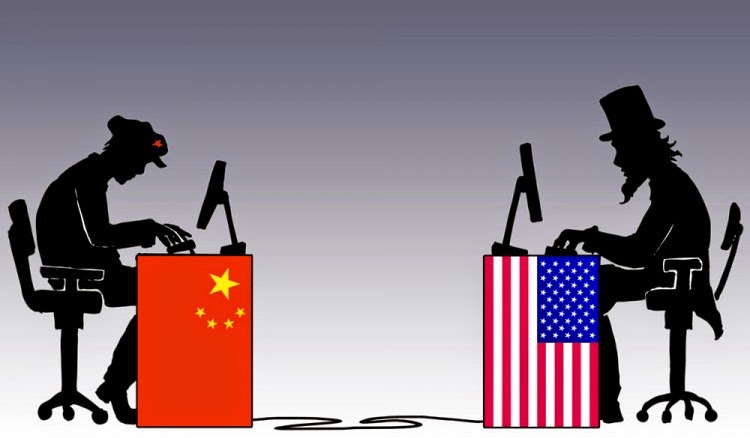Cyber relationship between U.S., China, said to be at ‘breaking point’
09/30/2015 / By usafeaturesmedia

(Cyberwar.news) Countries have historically used technology to spy on each other, but the advent of the cyber age is testing government-to-government relationships in a way that goes beyond simple espionage and could lead to disastrous consequences, say experts.
Nowhere is this more evident than in the relationship between the United States and China. As reported by the U.K.’s V3 web site, Beijing’s incessant hacking of U.S. corporate, government and military entities marks a dangerous escalation of a new kind of warfare that has the potential to spiral out of control and could spark devastating conventional responses, as well as cyber responses in kind.
A secret NSA map published by NBC News in July lays bare the gravity of the situation: Chinese hackers have targeted hundreds of U.S. businesses, government facilities and military databases successfully in recent years, resulting in untold damage to both corporate and national security.
As NBC News reported:
The map uses red dots to mark more than 600 corporate, private or government “Victims of Chinese Cyber Espionage” that were attacked over a five-year period, with clusters in America’s industrial centers. The entire Northeast Corridor from Washington to Boston is blanketed in red, as is California’s Silicon Valley, with other concentrations in Dallas, Miami, Chicago, Seattle, L.A. and Detroit. The highest number of attacks was in California, which had almost 50.
Stolen information includes intellectual property and military secrets – as well as data about the country’s critical infrastructure like telecommunications, electric grids, dams and the Internet backbone.
“…[P]rizes that China pilfered during its ‘intrusions’ included everything from specifications for hybrid cars to formulas for pharmaceutical products to details about U.S. military and civilian air traffic control systems,” intelligence sources told NBC News.
The map was prepared as part of an NSA briefing by the agency’s Threat Operations Center (NTOC) in February 2014, so it’s safe to assume that further intrusions have occurred since. The briefing focused on China’s interest in Google and defense contractors such as Lockheed Martin, as well as U.S. air traffic control systems.
The briefing listed documents and data that Chinese government hackers have “exfiltrated” – that is, stolen – from American corporate, government and military networks. It also listed the number and origin of China’s “exploitations and attacks.”
“The map suggests that NSA has been able to monitor and assess the Chinese cyber espionage operations, and knows which specific companies, government agencies and computer networks are being targeted,” NBC News reported.
One of the most highly publicized hacks in recent months has been the years-long Chinese breach of computer systems belonging to the Office of Personnel Management. As one official told Business Insider, “This is deep. The data goes back to 1985. This means that they potentially have information about retirees, and they could know what they did after leaving government.”
The official added, “Access to information from OPM’s computers, such as birthdates, Social Security numbers, and bank information, could help hackers test potential passwords to other sites, including those containing information about critical weapons systems.”
The U.S. has not sat idly by as China – and other nations including Russia and Iran – have gained access to American systems. According to former NSA contractor Edward Snowden, the U.S. government hacked into Chinese mobile phone companies to collect text messages and spied on the Tsinghua University, one of China’s biggest research institutions.
The university also manages one of China’s six major Internet backbone networks – the China Education and Research Network (CERNET), from where millions of Chinese citizens could be mined for data. CERNET was one of China’s first Internet backbone networks and has since evolved into the world’s biggest national research hub.
And, The New York Times reported in July, the Obama administration has decided to retaliate against China for its massive OPM hack, in which data on 20 million current and former U.S. government employees was stolen.
“One of the conclusions we’ve reached is that we need to be a bit more public about our responses, and one reason is deterrence,” one senior administration official involved in the debate, who spoke on the condition of anonymity to discuss internal White House plans, told the Times. “We need to disrupt and deter what our adversaries are doing in cyberspace, and that means you need a full range of tools to tailor a response.”
And Director of National Intelligence James Clapper has said that the sophistication of hacking aimed at the United States would worsen “until such time as we create both the substance and psychology of deterrence.”
And it is this “response begets response” cycle that some analysts fear the most. While establishing deterrence is important, they say, finding the right balance without escalating attacks to a point where one nation decides a more robust response – including a military response – is needed, is key.
Calum Jeffray, research fellow of national security and resilience at the Royal United Services Institute (RUSI), told V3 that there has always been a cool relationship between China and the United States when it comes to the web.
“U.S. and Chinese interests are often fundamentally opposed when it comes to issues of Internet governance. The U.S. approach favors openness and freedom of information, whereas China favors more state control over information in cyber space,” he told V3.
“However, I think it’s important to note that, thus far, China and the U.S. have restricted their activities to espionage, particularly economic espionage, rather than other forms of more hostile attack,” he added.
Added V3: “As this cyber arms race heats up security experts and researchers are now worried a ‘breaking point’ could fast be approaching as the two nations show no signs of backing down.”
Cyberwar.news has been consistently reporting on the cooling relations between U.S. and China…to find other in-depth articles about U.S. foreign relations and what to expect in the future, check out AlternativeNews.com.
Sources:
Tagged Under: China, cyber warfare




















